高中英语:unit5 reading学案(新人教版必修1)
- 格式:doc
- 大小:70.00 KB
- 文档页数:12
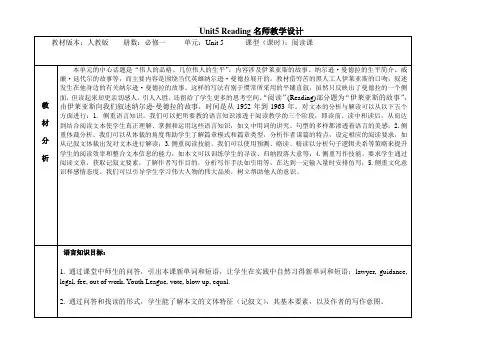
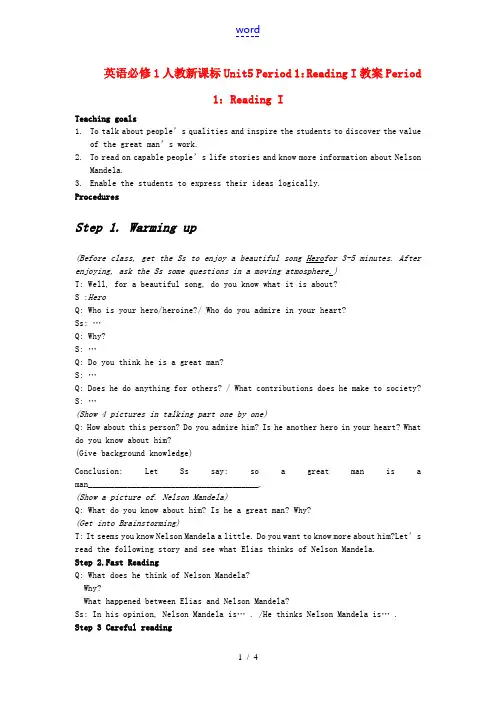
英语必修1人教新课标Unit5 Period 1:Reading I教案Period1:Reading ITeaching goals1.To talk about people’s qualities and inspire the students to discover the valueof the great man’s work.2.To read on capable people’s life stories and know more information about NelsonMandela.3.Enable the students to express their ideas logically.ProceduresStep 1. Warming up(Before class, get the Ss to enjoy a beautiful song Herofor 3-5 minutes. After enjoying, ask the Ss some questions in a moving atmosphere.)T: Well, for a beautiful song, do you know what it is about?S :HeroQ: Who is your hero/heroine?/ Who do you admire in your heart?Ss: …Q: Why?S: …Q: Do you think he is a great man?S: …Q: Does he do anything for others? / What contributions does he make to society? S: …(Show 4 pictures in talking part one by one)Q: How about this person? Do you admire him? Is he another hero in your heart? What do you know about him?(Give background knowledge)Conclusion: Let Ss say: so a great man is a man_______________________________________.(Show a picture of. Nelson Mandela)Q: What do you know about him? Is he a great man? Why?(Get into Brainstorming)T: It seems you know Nelson Mandela a little. Do you want to know more about him?Let’s read the following story and see what Elias thinks of Nelson Mandela.Step 2.Fast ReadingQ: What does he think of Nelson Mandela?Why?What happened between Elias and Nelson Mandela?Ss: In his opinion, Nelson Mandela is… . /He thinks Nelson Mandela is… .Step 3 Careful readingT: Here is your first impression about NM according to the Elias’ story. If you look through the story carefully, you’ll find more. Ok, why not read these two passages and finish the following chart by answering these questions?Q1: When and where was Elias born? What was he?( 1940, born, black worker )Q2: Was he educated? When? How long?( 1946( six), educated, two years )Q3: Why did he leave school so early?( not continue the fee )Q4: So what was the result? Could he get a job? What job? Was he happy then? Why? ( get, worried about, out of work, no passbook )Q5.Who helped him? What did Nelson Mandela do at that time?( Nelson Mandela, opened, advise )Q6. Why was the day Nelson Mandela told him what to do and helped him the happiest day of his life?( get …)Q7. What did Nelson Mandela organize? Why did he organize it? / What was the situation at that time?( ANC, no vote, not choose )Q8: Where did they live?( poorest )Q9: What did Nelson Mandela say?( accept, fight )Q10: How to attack the law?( broke, peacefully )Q11: But did they answer violence with violence? Why?( answer with violence, not allowed )Q12: Did Elias like violence? Did he join the ANC Youth League? Why?( realize his dream, make equal )Q13: So how did they do?(blow up )Q14: What would be the result if they were caught?( be put in prison )Q15: Later, he was put in prison. What is the prison? Why were they so afraid of hearing of its name?( Robben island, not escaped )Q16: It was the hardest time of his life, right? But at this moment who appeared?Did he help him? How?( began, taught )Q17: Did Elias study hard? How?( under…make candles..)Q18: As a result, he became a good student. Did he want to study further? Was he allowed to do that? What idea did Nelson Mandela think of?( allowed… not stopped…)Q19: Could Elias get the degree? Why did he feel good about himself?〔 not cleverer 〕Q20: Was Elias always staying in the prison? How long did he stay? Can he get a job?What job? Why?( four, educated )Q21: Could he do this job long? Why? So he lost the job. How long was he out of work?When did he find a job again? How?(found out, twenty years, came to power, helped again )Q22: Was Elias happy to accept this job? Did he give up this job? Why?( bad, came back to , encourage, said,)Q23: What did he think of this job now,? Why?( am proud to…)Q24: What’s the purpose of writing this story? How does the writer tell? How many parts was the whole story divided? / How many times did Nelson Mandela offer help to Elias?Ss: The purpose of writing this story is to … . The writer tells…by….Step4 RetellingT: We have known what happened between Elias and Nelson Mandela. Suppose you were Nelson Mandela/ Elia s’ wife, would you like to tell us something impressive? Retelling (Choose one of them to retell )1.Suppose you were Nelson Mandela, retell the story.2.Suppose you were Elia s’ wife, retell the story.Step5. Role play (an interview )T: All of you did a good job. Next, after Nelson Mandela and Elias’ wife, it is Elias’turn to tell us some stories. One of you act as Elias, who is the tour guide on RobbenIsland. And the other three, you are tourists and you can ask questions(Let students e to the front to show their interview. Students can start the interview like this:Tourist: How did you get to know Nelson Mandela? What did he do to help you keep your job in a gold mine?)Step6. Homework1.Try to find out some useful expressions and phrases.2.Work in four to find more information about Nelson Mandela.附板书设计:〔Blackboard Design〕。
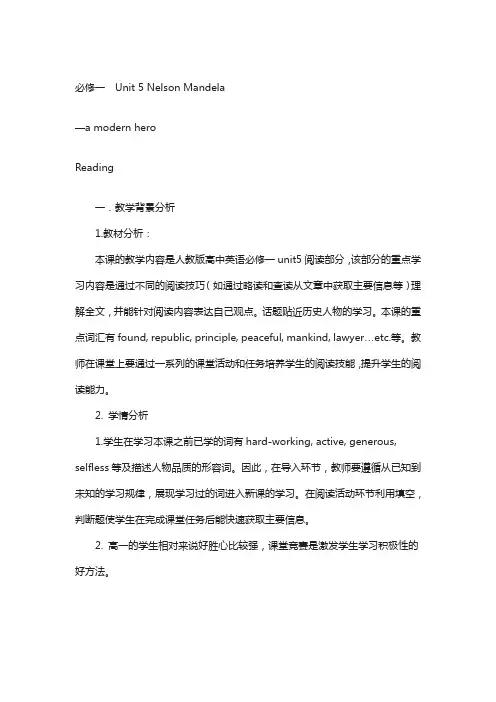
必修一Unit 5 Nelson Mandela—a modern heroReading一.教学背景分析1.教材分析:本课的教学内容是人教版高中英语必修一unit5阅读部分,该部分的重点学习内容是通过不同的阅读技巧(如通过略读和查读从文章中获取主要信息等)理解全文,并能针对阅读内容表达自己观点。
话题贴近历史人物的学习。
本课的重点词汇有found, republic, principle, peaceful, mankind, lawyer…etc.等。
教师在课堂上要通过一系列的课堂活动和任务培养学生的阅读技能,提升学生的阅读能力。
2. 学情分析1.学生在学习本课之前已学的词有hard-working, active, generous, selfless 等及描述人物品质的形容词。
因此,在导入环节,教师要遵循从已知到未知的学习规律,展现学习过的词进入新课的学习。
在阅读活动环节利用填空,判断题使学生在完成课堂任务后能快速获取主要信息。
2. 高一的学生相对来说好胜心比较强,课堂竞赛是激发学生学习积极性的好方法。
3. 本课主题以历史人物为话题,教师要充分激活学生对历史人物的崇拜之情,让学生富有爱戴之情完成阅读任务。
教师可让学生在课前上网查找曼德拉的相关信息。
4. 学生基础一般,学生程度参差不齐。
在设计这堂课时,任务应考虑学生的认知能力,从简到难,以适合各个层次的学生,使教学有效、高效。
二、教学目标:1. 知识与技能目标:1学习新单词found, republic, principle, peaceful, mankind, lawyer…etc.2)重点短语:out of work, as a matter of fact, blow up;3)通过不同的阅读技巧(如通过略读和查读从文章中获取主要信息等)理解全文,并能针对阅读内容表达自己观点. [中小学教育教学资料]2. 过程与方法目标:通过所设计的课堂活动和任务,让学生主动参与,在合作探究中学会学习和理解文章。
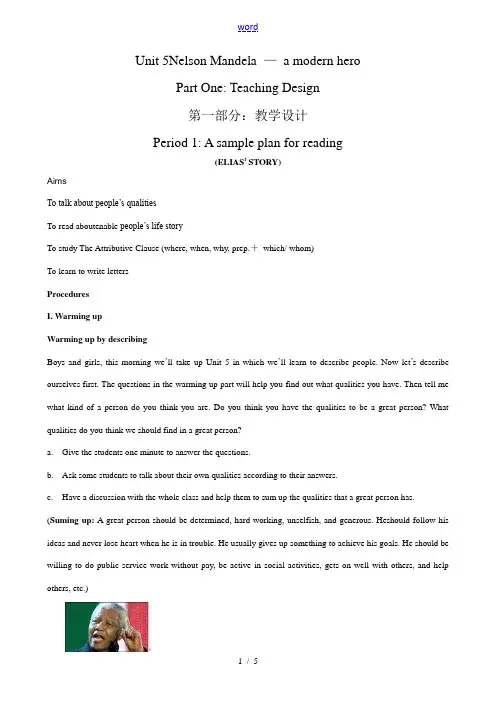
Unit 5Nelson Mandela —a modern heroPart One: Teaching Design第一部分:教学设计Period 1: A sample plan for reading(ELIAS’ STORY)AimsTo talk about people’s qualitiesTo read aboutenable people’s life storyTo study The Attributive Clause (where, when, why, prep.+which/ whom)To learn to write lettersProceduresI. Warming upWarming up by describingBoys and girls, this morning we’ll take up Unit 5 in which we’ll learn to describe people. Now let’s describe ourselves first. The questions in the warming up part will help you find out what qualities you have. Then tell me what kind of a person do you think you are. Do you think you have the qualities to be a great person? What qualities do you think we should find in a great person?a.Give the students one minute to answer the questions.b.Ask some students to talk about their own qualities according to their answers.c.Have a discussion with the whole class and help them to sum up the qualities that a great person has. (Suming up: A great person should be determined, hard-working, unselfish, and generous. Heshould follow his ideas and never lose heart when he is in trouble. He usually gives up something to achieve his goals. He should be willing to do public service work without pay, be active in social activities, gets on well with others, and help others, etc.)Warming up by brainstormingBoys and girls, in Unit 5 we will talk about Nelson Mandela, a great leader who fights for the rights of the black people. When talking about a person, what adjectives can you think of to describe his or her qualities? What are the qualities you should find in a great person?(Adjectives for describing a person: kind, honest, brave, loyal, happy, wise, smart, friendly, warm, cheerful, popular, generous, hard-working, diligent, weak, stupid, lazy, dishonest, mean, tense, cold, unkind, miserable, dull, strong-minded, determined,)Warming up by expressionsBoys and girls, we are going to learn about some great people in Unit 5. Can you name some great people? Now discuss in groups of four: Who do you admire most? What kind of person is he/she? What are the qualities that great people have in mon?Sun Yat-sen(November 12, 1866–March 12, 1925) was a Chinese revolutionary leader andstatesman who is considered by many to be the “Father of Modern China”. He had a significantinfluence in the overthrow of the Qing Dynasty and establishment of the Republic of China. Afounder of the Kuomintang, Sun was the first provisional president of the Republic of China in1912 and de facto leader from 1923 to 1925. He developed a political philosophy known as theThree Principles of the People. Sun is uniquely admired by most Chinese. Yet, his life was one ofconstant struggle and frequent exile as few of his visions for his countrymaterialized.II. Pre-reading1. Now, look at the six people in the pre-reading part. Can you recognize them? Do you think they are important people? (Yes. Because they have done something really important to benefit the world or a country. ) But do you think all of them are great people?2.Speaking task: Students read the information of each of the six persons and discuss in pairs to find out whether he is a great person or not according to the criteria they worked out in the previous step.Remind the students to use the following expressions for giving and asking for opinions:A sample dialogue:A: Do you think William Tidal is a great person?B: Yes. I think so. He had a strong belief that all people should be able to read the Bible for themselves. So he translated and printed it into English although he was not allowed to do so. And later he died for his work.A: Yes. I agree. William Tyndale went through a lot of struggles and difficulties and even sacrificed his life to realize his dream. He is a great person that everybody who picks up the Bible must think of. Now, let’s e to Norman Bethune. What do you think of him?B:….III. Reading1. Skimming for general ideaSo far we have talked a lot about great people. Do you want to know more about them and learn from them? Well, this morning we are going to read about Nelson Mandela, who was considered as a modern hero. Now open your books topage 34 and read the title of the text. What kind of writing is the text, can you guess? … Yes. A story isusually a piece of narrative writing. Now skim the text to get the general idea: What does Elias tell about in his story? (He tells about his life, how Mandela helped him and how he supported Mandela.)2.Listening and scanning for detail informationa. Listen to the text again and do prehending Ex.... 1.True: 2, 4 False: 1, 3, 5, 6, 7, 8b. Scan the text and do prehending Ex. 2.3.Questions for further understandingDiscuss the following questions in groups of four:a.How did the white people stop the black people from being treated fairly?b.Why did Elias support Mandela?c.Why did he support violence when he did not agree with it?IV. Closing downClosing down by discussinga.What do you learn about Nelson Mandela from ELIAS’ STORY?b.Do you like the way Elias tells his story? Give a reason.Closing down by retellingRetell the story according to the following clues:introduction of Elias’ problem; Mandela’s help; Elia s’ supportClosing down by an interviewAsk the student to do an interview in pairs. A journalist is interviewing Elias with the following questions:When did you first meet Mandela?Can you tell me more about how he helped you?Can you tell me about the problems that the black people are facing? How do you like his idea of peaceful fighting?What do you think of him?What will you do to support him in the future?。
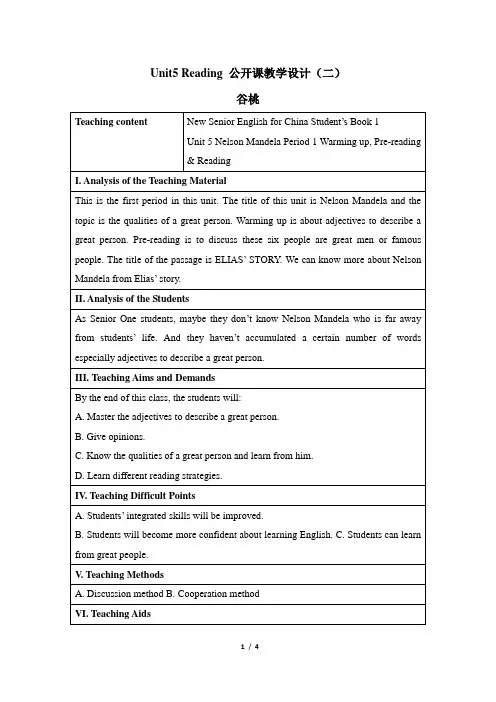
Unit5 Reading 公开课教学设计(二)谷桃Step 1. Warmers (Warming up and pre-reading)Activity 1—Divergent Thinking① Listen to a part of Martin Luther King, Jr’s speech—I have a dream.② Listen to Obama’s speech and pick out the adjectives he used in his speech.③ Listen to other people’s opinions about Mandela and pick out the adjectives they usedActivity 2—Active Thinking(qualities of great people) P 33able determined helpful loyal responsible wbrave e humble nice scalm f independent optimistic thoughtfulc g k popular wiseActivity 3—DescriptionIn my opinion/I think William Tyndale is a great/famous person who is hard-working and strong-minded.I think Norman Bethune is a great person who …Step 2. Fillers (Active Reading)Activity 1—Skimming1. Predict the relationship between Mandela and Elias.2. Who is the person on Page 34?3. What’s the main idea of the story?4. Search the information.time What happened to Elias?19521963Activity 2—Detailed Reading1. Before Elias met Mandela.Please read Para. 2 and answer the questions.1) What was Elias’ life like?His family… His ability… His job…2) Please find adjectives to describeElias’feelings____________________2. After Elias met Mandela—E got help from M. Please readPara. 3 and finish the tasks.1) What help did Mandela offer to Elias? He told Elias…2) Which adj. did Elias use to describe the day? __________3) How did Elias feel about his future then? __________3. After Elias met Mandela—E supported M.Please read the last Para..1) Please find adjectives to describe Elias’ situation and his feelings. _____________ but ___________.2) Please find two sentences to support the adjectives._____________________________________________________________________ _________________________________________________________Step 3. Coolers (Post-reading)Activity 1— ConclusionAs for Elias, Mandela’s help changed __________________________________.As for black people, Mandela helped them______________________________. Mandela devoted all his life to helping others.Great people are those who devote____________________________________. Activity 2—Integrated Development1) Mandela in my students’ eyes.2) Mandela in your eyes (Write down your ideas).Consolidation Homework Compulsory1) 你担任你校报社小记者,请用英语为报社人物专栏介绍一位传奇人物Nelson Mandela。
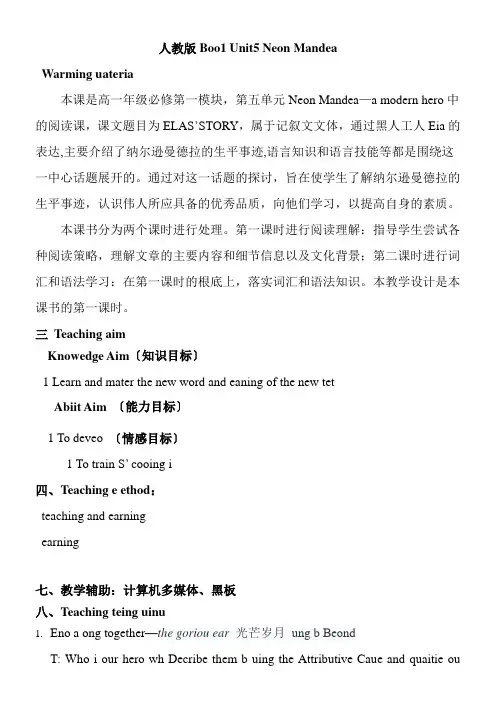
人教版Boo1 Unit5 Neon MandeaWarming uateria本课是高一年级必修第一模块,第五单元Neon Mandea—a modern hero中的阅读课,课文题目为ELAS’STORY,属于记叙文文体,通过黑人工人Eia的表达,主要介绍了纳尔逊曼德拉的生平事迹,语言知识和语言技能等都是围绕这一中心话题展开的。
通过对这一话题的探讨,旨在使学生了解纳尔逊曼德拉的生平事迹,认识伟人所应具备的优秀品质,向他们学习,以提高自身的素质。
本课书分为两个课时进行处理。
第一课时进行阅读理解:指导学生尝试各种阅读策略,理解文章的主要内容和细节信息以及文化背景;第二课时进行词汇和语法学习:在第一课时的根底上,落实词汇和语法知识。
本教学设计是本课书的第一课时。
三Teaching aimKnowedge Aim〔知识目标〕1 Learn and mater the new word and eaning of the new tetAbiit Aim 〔能力目标〕1 To deveo〔情感目标〕1 To train S’ cooing i四、Teaching e ethod:teaching and earningearning七、教学辅助:计算机多媒体、黑板八、Teaching teing uinu1.Eno a ong together—the goriou ear 光芒岁月ung b BeondT: Who i our hero wh Decribe them b uing the Attributive Caue and quaitie oucan refer to thee eone ee, that’ o You can ue the ef to our countr, o I thin he i the hero of everone in China Now, e omething about our heroS:…T: Good! Toda we wi going to earn another hero-Neon Mandea〔Thi i intended to around tudent’interet The are ver farmiiar with thi ong, but ma be the don’t now the famou ong i about Neon Mandea 〕Ste odern heroWhat’ the reationhiand u ming for the main idea of each e wa one of m haot no right at aet Neon Mandea1.Severa minute atter,chec the anwer with the whoe ca2 Chooe the bet anwer1Who i Neon MandeaA a teacherB a awerC a doctor2What i the genera idea of the tor The tor i about_____A the et Neon Mandea, and what Mandea didD How Eia met Mandea3 It can be inferred from the ent buidingC Eia met Neon Mandea at chooD The government wa haentA The fought againt the government in a ent officiaC The ied man white e government buidingA Becaue he ied vioenceB Becaue it wa not dangerouC Becaue he thought it wa a wa to mae bac ouThi i intended to et the S now ome detai about Eia’ torStemarEia wa born in 1940 At the age of i, he______ choo However, he had to ______choo in 1948 becaue hi fami coud not _______ the choo ______and the bu _____ After tring hard, Eia got a ob Unfortunate, he wa amot ___ ___ wor ince he had no _________to ive in JohanneburgEia fet it a ver ________ e It wa in 1952 that Eia met Neon Mandea He offered ________ to Eia, which made Eia______ Therefore when Neon Mandea he oined it In 1963, Eia hee government buiding He beieved Mandea woud heae bac and white ain idea of the tet betterSte inute to dicu the foowing quetion and then a them to anwer them1Do ou thin Neon Mandea i a great -hearted inde ae ure S can earn ome good quaitie from Neon Mandea 〕SteeworRead the ret of Eia tor on odern hero Eia’ Stor参考资料1 ?普通高中课程标准实验教科书英语1?,人民教育出版社,2021年5 月;2?普通高中课程标准实验教科书英语1教师教学用书?,人民教育出版社,2021 年6月;3?普通高中英语课程标准?,人民教育出版社, 2021年4月。
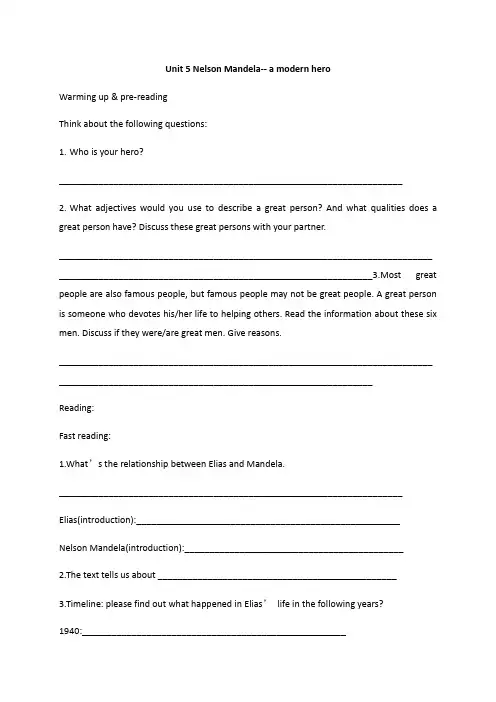
Unit 5 Nelson Mandela-- a modern heroWarming up & pre-readingThink about the following questions:1.Who is your hero?_____________________________________________________________________2.What adjectives would you use to describe a great person? And what qualities does a great person have? Discuss these great persons with your partner.___________________________________________________________________________ _______________________________________________________________3.Most great people are also famous people, but famous people may not be great people. A great person is someone who devotes his/her life to helping others. Read the information about these six men. Discuss if they were/are great men. Give reasons.___________________________________________________________________________ _______________________________________________________________Reading:Fast reading:1.What’s the relationship between Elias and Mandela._____________________________________________________________________Elias(introduction):_____________________________________________________Nelson Mandela(introduction):____________________________________________2.The text tells us about ________________________________________________3.Timeline: please find out what happened in Elias’life in the following years?1940:_____________________________________________________1946:_____________________________________________________1948:_____________________________________________________1952:_____________________________________________________1963:_____________________________________________________Careful reading:1.Read the passage carefully and decide whether they are true or false and give a reason.1).Elias went to see Nelson Mandela when he was in trouble.2). Elias left school because the school was too far from his home.3). Nelson Mandela helped him keep his job.4).Elias trusted Nelson Mandela and he joined the ANC Youth League.5). Elias was willing to blow up government buildings.6). Nelson Mandela thought violence was a good way to help black people.Work in pairs and answer the following questions.1)Why did Elias visit Nelson Mandela?___________________________________________________________________________ _______________________________________________________________2)What did Mandela do to help black people?___________________________________________________________________________ _______________________________________________________________3)What was Elias’s attitude towards the unfair situation black people faced? How do you know?___________________________________________________________________________ _______________________________________________________________4)Why did Nelson Mandela turn to violence to make black and white people equal?___________________________________________________________________________ _______________________________________________________________Post reading:Discuss in your group whether people should fight against injustice with violence. Give your reasons.___________________________________________________________________________ ___________________________________________________________________________ ___________________________________________________________________________ ___________________________________________________。
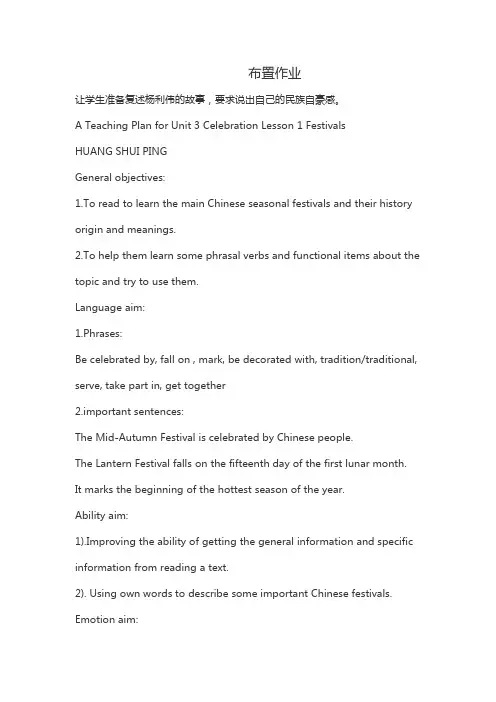
布置作业让学生准备复述杨利伟的故事,要求说出自己的民族自豪感。
A Teaching Plan for Unit 3 Celebration Lesson 1 FestivalsHUANG SHUI PINGGeneral objectives:1.To read to learn the main Chinese seasonal festivals and their history origin and meanings.2.To help them learn some phrasal verbs and functional items about the topic and try to use them.Language aim:1.Phrases:Be celebrated by, fall on , mark, be decorated with, tradition/traditional, serve, take part in, get together2.important sentences:The Mid-Autumn Festival is celebrated by Chinese people.The Lantern Festival falls on the fifteenth day of the first lunar month. It marks the beginning of the hottest season of the year.Ability aim:1).Improving the ability of getting the general information and specific information from reading a text.2). Using own words to describe some important Chinese festivals. Emotion aim:To promote students’qualities of a patriotism(爱国主义精神,爱国心) by learning the main Chinese festivals and learn their history origin and their meanings。
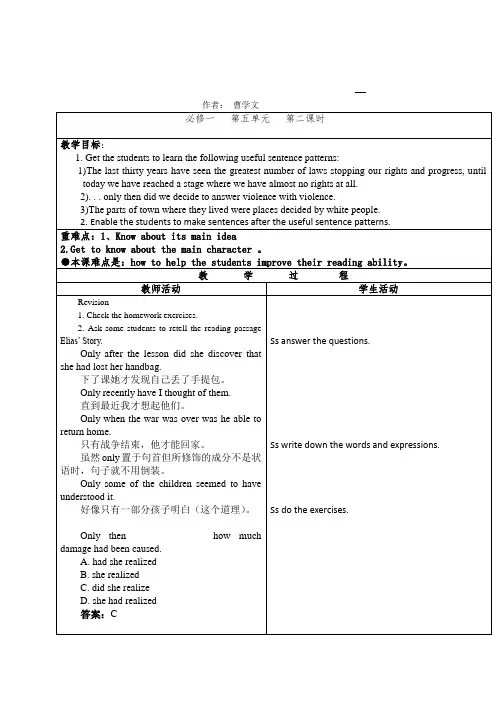
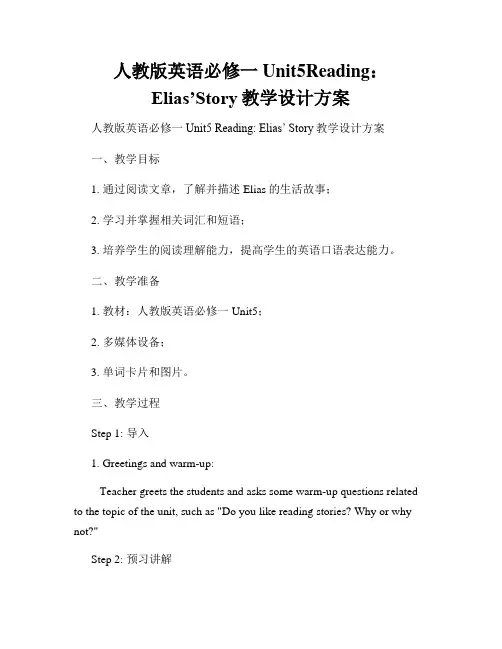
人教版英语必修一Unit5Reading:Elias’Story教学设计方案人教版英语必修一Unit5 Reading: Elias’ Story教学设计方案一、教学目标1. 通过阅读文章,了解并描述Elias的生活故事;2. 学习并掌握相关词汇和短语;3. 培养学生的阅读理解能力,提高学生的英语口语表达能力。
二、教学准备1. 教材:人教版英语必修一Unit5;2. 多媒体设备;3. 单词卡片和图片。
三、教学过程Step 1: 导入1. Greetings and warm-up:Teacher greets the students and asks some warm-up questions related to the topic of the unit, such as "Do you like reading stories? Why or why not?"Step 2: 预习讲解1. Pre-reading discussion:Teacher asks students to discuss the questions in groups: "What do you know about Ethiopia? Have you heard about children who have to work to survive?"2. Vocabulary introduction:Teacher presents and explains some key vocabulary related to the passage, using realia, pictures, and examples.Step 3: 阅读理解1. Skimming and scanning:Teacher guides students to skim the passage to get a general idea about Elias' story, and then scan specific paragraphs to find answers to given questions.2. Group discussion:Students work in groups to discuss and answer comprehension questions related to the passage.3. Class discussion:Teacher leads a whole-class discussion, and students share their answers and thoughts about Elias' story.Step 4: 语言点拓展1. Language focus:Teacher focuses on language points in the passage, such as grammar, sentence structure, and vocabulary usage. Examples and exercises are used to practice and reinforce the language points.2. Language practice:Students work individually or in pairs to complete language exercises related to the passage, using the target language points.Step 5: 拓展活动1. Extension activities:Teacher provides extra reading materials, videos, or interviews related to child labor and poverty issues for students to explore and discuss further.2. Role play:Students are divided into groups and assigned different roles to act out a dialogue or scene related to Elias' story, showcasing their understanding and empathy toward the topic.Step 6: 总结和评价1. Summary:Students summarize what they have learned from the passage and the activities.2. Evaluation:Teacher assesses students' performance in terms of their participation, comprehension, and language skills.Step 7: 作业布置1. Homework assignment:Students are assigned tasks such as writing a reflection on Elias' story, researching and presenting on child labor issues in different countries, or preparing a skit based on the passage.2. Review:Teacher reminds students to review the vocabulary, grammar, and reading strategies covered in this class.四、教学反思通过本节课的教学设计,学生在阅读、讨论、语言点拓展和互动活动中,可以全面理解并描述Elias的生活故事。
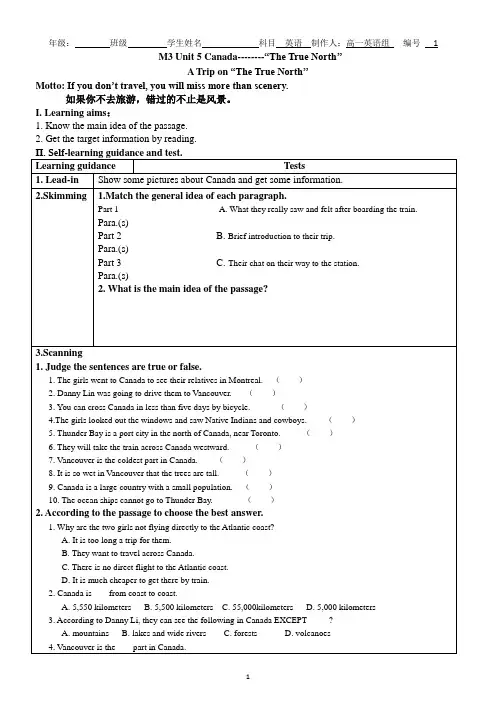
年级:班级学生姓名科目英语制作人:高一英语组编号 1M3 Unit 5 Canada--------“The True North’’A Trip on “The True North’’Motto: If you don’t travel, you will miss more than scenery.如果你不去旅游,错过的不止是风景。
I.Learning aims:1. Know the main idea of the passage.2. Get the target information by reading.II.ConsolidationLevel A Fill in the blanks according to the passage.Li Daiyu and Liu Qian took the train in Canada from_____ to______. The cousins’ friend, Danny Lin, took them to the train station to catch“_____ _____ _____”. Canad a is the ______ biggest country in the world. It is 5,500 kilometers from ______ to ______. As they go _________, they saw beautiful scenery as well as cities. Vancouver is __________ by mountains on the north and east. When the cousins _____ _____ in the seats, they looked out of the window. They saw mountains goats and even a _____ bear. Calgary is famous for its competition. Many of the cowboys from all over North American ______ ______ ______ ______ working with animals. Then they ______ _______ a wheat-growing province. Thunder Bay is a busy port city.今日之事今日毕日积月累成大器。
Reading and Thinking—ComprehendingLearning Aims(学习目标)1.Learn some new words.2.Grasp the general idea of the passage.(重点难点)3.Learn some important sentences.(重点难点)阅读下列课文原句,写出黑体词汇的汉语意思1.China is widely known for its ancient civilisation which has continued all the way through into modern times,despite the many ups and downs in its history.尽管浮沉;兴衰2.It dates back several thousand years to the use of longgu—animal bones and shells on which symbols were carved by ancient Chinese people.追溯到骨头壳符号雕刻3.Over the years,the system developed into different forms,as it was a time when people were divided geographically,leading to many varieties of dialects and characters.变体;异体地方话;方言文字4.The high regard for the Chinese writing system can be seen in the development of Chinese characters as an art form,known as Chinese calligraphy,which has become an important part of Chinese culture.尊敬体系;系统文字书法5.As China plays a greater role in global affairs,an increasing number of international students are beginning to appreciate China’s culture and history through this amazing language.全球的公共事务欣赏;重视Task 1宏观架构整体理解Ⅰ.Read the passage quickly and then fill in the blanks.Ⅱ.The passage mainly tells us how the Chinese writing system developed.Task 2微观剖析细节把握1.Which period does Chinese ancient civilisation continue into?A.Shang Dynasty. B.Qin Dynasty.C.Tang Dynasty. D.Modern times.〖答案〗 D2.We can learn from the third paragraph that .A.Shang Dynasty ended in 1600B.these symbols didn’t develop in Shang DynastyC.the Chinese people were divided geographically,which led to many varieties of dialects and charactersD.varieties of dialects and characters began to form in Qin Dynasty〖答案〗 C3.Which of the following statements is NOT true?A.The Chinese writing system plays an important part in Chinese culture.B.The Chinese writing system is an amazing language.C.The Chinese writing system is the only factor of the Chinese ancient civilisation.D.Written Chinese has connected China’s present with its past.〖答案〗 C4.Which section is this passage likely to appear in the newspaper?A.Health. B.Culture.C.Travel. D.Hobby.〖答案〗 BTask 3文本理解美句欣赏1.Read the passage carefully and find out the sentences including adverbials or adverbial clauses of concession.(细读短文并找出含有让步状语或让步状语从句的句子)〖答案〗(1)China is widely known for its ancient civilisation which has continued all the way through into modern times,despite the many ups and downs in its history.(2)Even today,no matter where Chinese people live or what dialect they speak,they can all still communicate in writing.2.Read the passage carefully and find out the expressions including adverbials of time.(细读短文并找出含有时间状语(从句)的词汇)〖答案〗(1)at the beginning(2)by the Shang Dynasty (around 1600-1046 BCE)(3)over the years(4)todayTask 4读后升华思维品质Ⅰ.After reading the passage,please fill in the following blanks.Chinese calligraphy has developed along 1.with China’s civilisation.It is difficult to say when exactly calligraphy 2.started(start).Chinese writing was first done by 3.carving(carve) symbols onto bones and shells.Some of the ancient symbols can still 4.be seen(see) in today’s hanzi.These symbols had become 5.a well-developed writing system by the Shang Dynasty when the Chinese people were divided geographically,leading to many 6.varieties(variety) of dialects and characters.In Qin Dynasty,the Chinese writing system began to develop in one direction,7.which was important in uniting the Chinese people and culture.Modern Chinese people can still read classic works which were written by ancient Chinese.By this means,China’s present is connected with 8.its(it) past.Besides,Chinese calligraphy has become an important part of Chinese culture.As China plays a 9.greater (great) role in global affairs,an increasing number of international students 10.are(be) beginning to appreciate China’s culture.Ⅱ.Discuss with your partner and then answer the following questions.1.Nowadays,many people prefer to type the Chinese characters on the keyboard rather than write them with a pen or a pencil.What do you think of it?2.According to the writer,the Chinese writing system is one factor that has helped the Chinese language and culture survive.What do you think are some of the other factors?译文:尽管历史跌宕起伏,中国因其古老文明一直延续至今而闻名于世。
Reading and Thinking(1)——通文本THE CHINESE WRITING SYSTEM:CONNECTING①THE PAST AND THE PRESENTChina is widely② known for③ its ancient civilisation④ which has continued all the way through⑤into modern times, despite⑥the many ups and downs⑦in its history 〖1〗.There are many reasons why this has been possible〖2〗,but one of the main factors⑧ has been the Chinese writing system.〖1〗which引导的定语从句修饰先行词its ancient civilisation。
〖2〗关系副词why引导的定语从句修饰先行词reasons,同时why在从句中作原因状语。
At the beginning, written Chinese was a picture-based⑨language.It dates back several thousand years to⑩ the use of longgu—animal bones⑪ and shells⑫ on which symbols⑬ were carved⑭ by ancient Chinese people〖3〗.Some of the ancient symbols can still be seen in today’s hanzi.〖3〗“介词+关系代词”引导的定语从句修饰先行词animal bones and shells。
which指代animal bones and shells。
Module1Unit 5 reading学案I. Read for general understanding.1)Read for the main idea of each paragraph.2) Try to analyze the structure of the passage.II. Skimming(Individual work):Take a quiz below and according to the questions; see whether they can grasp the details of the text.1. Why did Elias have to leave school?A. Because he didn't have a passbook.B. Because his home was far from the school.C. Because his family couldn't afford the school fees.D. Because he couldn't read or write.2. Nelson Mandela opened a black law firm in order to .A. make moneyB. help the poor black people with their problemsC. make himself famousD. study law3. How did Nelson Mandela help Elias keep his job?A. He talked with Elias' boss.B. He helped him get the correct papers.C. He lent him some money.D. He asked him to go to court.4. Why did Elias help Nelson Mandela blow up some government buildings?A. Because he liked violence.B. Because it was not dangerous.C. Because he thought it was a way to make black and white people equal.D. Because he wanted to be famous.5. What dream did Nelson Mandela have?A. To become the president of South Africa.B. To win the Nobel Peace Prize.C. To make black and white people equal.D. To blow up some government buildings.6. What does the word “leave” in the 3rd line of Para 2?A. go away from a placeB. give up; stopC. forget to takeD. cause sb. to be in a certain condition7. What can we infer from this part?A. Elias was a black worker in Johannesburg.B. Elias received little education when he was young.C. Mandela opened a law firm to help black to share their problems.D. Black people in Johannesburg are not treated equally.Choose the best answer to complete each sentence .1 Elias was unhappy in the prison because ________A he was kept with the criminalsB the prison guards studied with himC he had to studyD he could not study for a degree2 Nelson Mandela showed how good a leader he was becauseA he fought the guards in prisonB he refused to let the guards study in his schoolC he let the guards study in his school but not take the examsD he let the guards study even though the prisoners could nottake the exams3 Life for Elias was not too bad in prison because_________A he had to studyB he could study with the guardsC he wanted to study C he could study and get a degree4 As leader of South Africa , Nelson Mandela helped prisoners of Robben Island by__________A giving them an educationB giving them moneyC putting the guards in prisonD giving them a jobIII. Scanning(Team work):Re ad the text carefully and try to find more details from the text then make a timeline of Elias’s life, according to the time below.1940 born 1942 a two years old baby. 1944 four years old. 1946 began school.1948 left school. 1950 opened__________________ law firm.1952 12/ met Mandela. 1954 14 / encouraged by MandelaIV. RetellingAccording to the timeline of Elias’s life, use some important words andphrases to retell the text. Retell the passage in third person with the help of the following hints:Elias black worker South Africa little education difficulties at the age of 12 Mandela with sb’s help moved kindness Elias’ time life for the blacks hard rights choose unequally ANC Youth League equal rights join peaceful way law not allow violence with violence dream ______(,a ____________________in________________,) first met Nelson Mandela __________________. At that time, Mandela was the black________ who offered__________ to poor people on their legal problems.Elias needed Nelson’s help because he had very ___________ . He got a job in a gold mine. Sadly he didn’t have a passbook to live in Johannesburg and he __________ about whether he would become _______of work. (Mandela told)Elias how to get the __________ papers so he could stay in Johannesburg/_________________, Elias knew how to get the __________ papers so as to stay in Johannesburg. Elias never __________ Mandela’s _________(how kind Mandela was). /During Elias’ time, life for the blacks was hard. They had no rights to choose and were treated unequally. So when Mandela organized the ANC Youth League to fight for the equal rights of the blacks, Elias joined it as soon as he could. /When Mandela organizedthe_________________, Elias _________it as soon as possible.In 1963, Elias helped Mandela___________ up some government buildings./ At first they tried some _______ way to break the law but it was __________. As a result, they had to answer __________________ to realize their _________of making black and white people equal. Though it was dangerous, Elias was very _________ to help.When Elias lost his job and was __________, his wife was very unhappy. She knew this means he was _________ when all she wanted was a _______ life with enough money every month. She tried to _______ him not to fight the government as she thought it was better to ______ that in South Africa black people were not as important as white people. But he was willing to _______ the fight and help Nelson Mandela with equal rights for black people. For a ______ time she felt helpless and ________, but Elias encouraged her with stories of how good life would be when white and black people worked and played together. He ___________________ to advise black people on their problems.Unit 5词汇学案Fill in the chart belowUsing Language Listening1 Listen to the tape and find out the reason why Elias joined the ANC Youth League .Then answer the following questions .1 What is a passbook ?A A book to help you pass exams .B A book to show your identity .C A book to tell you where to live .D A book to tell you how to live2 Why is it important ?A For traveling outside South Africa .B For showing where you were born .C For traveling inside South Africa .D For getting a job .3 What job did Elias want to do ?A To work with other black workers .B To work as a cleaner .C To teach in a primary school .D To work in the mines.4 Who worked underground ?A The white workers .B The black and white workers .C The black workers .D Foreign workers .5 Who worked on the surface ?A The black workers .B The black and white workers .C The white workers .D Foreign workers .6 Where did Elias live ?A In a classroom .B In a home of his own .C In a large room with beds .D With his family .。
2019新人教必修1Unit5Languages around the worldPeriod6 Reading for writing学习目标1.Figure out and summarize your English learning problems.2.Know how to write a blog about English learning problems.3.Master some words and informal expressions related to writing a blog.课堂探究Part ⅠReading for informationActivity 1Read these posts on Page 66 and answer the following questions.1.Who starts this blog?2.Who responds to it?3.What is the blog mainly about?Activity 2Fill in the table on Page 67,and if possible,draw a mind map to show your answers.Part ⅠPreparing for writing a blogActivity 1List your learning problems in English and brainstorm some useful advice.Problem AdviceI cannotunderstandthe teacher’sEnglish inclass.Activity 2Sum up the useful expressions for problems and advice.Part ⅠWriting a blog about English studyActivity 1Choose one of the problems from your group discussion.Activity 2Write a blog based on the discussion and evaluate the draft using the check list.General content √Do you give a clear description of the problem?√Is the advice clearly explained?√Does each sentence relate to the main idea?Basic writing skills √Do you use pronouns to refer to things or people correctly? √Do you use correct spelling,punctuation,and capitalisation? √Are there any grammar mistakes?Part Ⅰ Homework1.Put up your writing in the classroom or read it to the class.2.Retell the useful words and expressions about problems and advice. 参考答案Part ⅠActivity 1 1.Wang Le.2.Liu Wen,Jia Xin and Li Rui.3.The blog is mainly about the students’ problems about learning English and their advice.Activity 2Part Ⅰ Activity 1The answer may vary.Activity 2Part Ⅰ Activity 2I have trouble with phrasal verbs.There are so many of them and it seems impossible to work out the meanings just from the words.And some of the verbs have different meanings.For example,“put off” can mean postpone,discourage (someone from doing something),and make someone dislike (something).I try to use phrasal verbs sometimes,but I usually use the wrong one!My classmates had some suggestions for me.One is to use the flash card on which I write down the phrasal verb and a sentence with it.In this way,I can study these cards when I have time.Another suggestion is to use the phrasal verb inasentence that is true for me so that it’s easier to remember.I’m trying them now.I hope they will work for me.。
Book 1 Unit 5 Reading and ThinkingThe Chinese writing system: connecting the past and thepresentLearning aims(学习目标):1.Have a better understanding of the development of Chinese characters and its importance.2.Introduce the development of Chinese characters in English.3.Improve the ability of skimming, scanning, analyzing discourse and thinking logically.4.Strengthen national confidence and pride.Step I: Pre-reading(读前活动)Activity 1. Guessing gameShow students some pictures and guess the following symbols.Think: How do the characters develop over time?Activity 2. Video TimeStep II: While-reading(读中活动)Activity 1. Read for main idea1.Main idea of the whole passageIt is about the of Chinese character.2.Match the idea of each paragraphPara 1 A. Written Chinese connects China's present with its past,and has become an art form.Para 2 B. The Chinese writing system is one of the reasons whyChinese civilization has survived into modern times.Para 3 C. Written Chinese was a picture-based language at the beginningPara 4 D. The Chinese language is helping to spread China's culture andhistory to the world.Para 5 E. The writing system became well-developed, and gradually_ __________ carved on animal bones and shells which are called___________.By the Shang DynastyWhat happened to the symbols by the Shang Dynasty?By the Shang Dynasty, the symbols had become a________ __________ _______.Over the yearsHow did the system develop over the years? Why did it develop?Over the years, the system developed into ______ _______becausepeople lived in different parts of the country, leading to many varieties of ______ ______ ______.In the Qin DynastyWhat did Emperor Qinshihuang do?How did written Chinese unify Chinese people divided by geography and dialects?In the Qin Dynasty, the Chinese writing system began to develop _____ ________ because Emperor Qinshihuang ______ ____ _____ ______ ________.In the modern timesIt becomes an important part of Chinese culture, which is ___________. TodayToday, as China plays a greater role in_____ ______.1.Critical ThinkingWhat are the functions of the Chinese writing system?(1). No matter where Chinese people live or what dialect they speak, they can still communicate in writing. Connect people divided by geography(2). Written Chinese has also become an important means by which China's present is connected with its past. Connect the and the(3). The high regard for the Chinese writing system can be seen in the development of Chinese characters as an art form, known as Chinese Calligraphy, which has become an important part of Chinese culture.Connect the and the(4). As China plays a greater role in global affairs, an increasing number of international students are beginning to appreciate China's culture and history through this amazing culture. Connect and theStep III: Post-readingDiscussionWhat can we do to connect with the world?Step IV: Homework (限时作业:二选一)1.Find the important words and sentences in the passage(15mins).2. Retell the short history of Chinese writing system based on the timeline(10mins)。
高中英语 Unit 5 第1学时Warming up and reading学案新人教版必修1up and reading学案新人教版必修1【单元导航】Nelson Mandela was born on July19,1918, near Umtata, Transkei、 To pursue a political career, he renounced his right to succeed his father as chief of the Tembu tribe、He studied law by correspondence、 In1944 he joined the African National Congress (ANC)and helped found its influential Youth League、 His first jail sentence(suspended)was for the ANC’s1952 Defiance Against Unjust Laws Campaign、 After the1960 massacre of thousands of unarmed pass-law protesters, Mandela became a fugitive、 Security police caught him in1962、 Mandela was set free on Feb、11,1990、 He shared the1993 Nobel peace prize with South Africa’s president、Period1 Warming Up and ReadingStep1 Warming upTask1、T alk about great people◇Read the information about the six men on page33 and discuss whether they are great people、 (groupwork)____________________________________________________ ________◇ Can you name more greatpeople?__________________________________________________ __________◇ Who do you admire most? What kind of person ishe/she?__________________________________________________ __________Task2、Brainstorming ◇What are the qualities that great people have in common?warm-heartedQualities of great peopleselflessStep2 SkimmingTask1、Read the text quickly and answer the questions、◇ Which great person is mentioned in thispassage?_________________________________________________ __________ ◇ What does Elias tell about in hisstory?___________________________________________________ _________Task2、 Main idea of the passage The passage told us the _______ of Nelson Mandela through Elias’ story、 The poor black worker, Elias, met Nelson Mandela ________ itwas a very _____________ time of his life、 ________ the help of Nelson Mandela, Elias got equal and hopeful days、 Then he ________ in the ANC Youth League and helped the ________ for the __________ rights、Step3 Careful readingTask1 Go through the text quickly and find the main idea for each paragraphPartParagraphMain idea1 The life of Elias’ life before he met Nelson Mandela、2The change of Elias’ life after he met Nelson Mandela and what Mandela did、Task2 Read the text carefully and finish timeline of Elias’ life、 Biography (人物传记) ◇1940…、______________________________________________________◇1946…、______________________________________________________◇1948…、______________________________________________________◇1952…、______________________________________________________◇1963…、______________________________________________________Tas k3、Intensive reading◇、 Work in pairs and finishthe True or False and tell why、1)、 Elias went to see Nelson Mandela when he was in trouble、 ( )2)、 Eliasleft school because the school was too far from his home、 ( )3)、 Nelson Mandela helped him keep his job、( )4)、 Elias trusted Nelson Mandela and he joined the ANC Youth League、 ( )5)、 Elias was willing to blow up government buildings、 ( )6)、 Nelson Mandela thought violence was a good wayto help black people、( )◇、Choose the best answer to each question、1、Which is not true about the black in the early1960?A、 They could not get any job、B、 They had right to vote or choose their leaders、C、 They lived in the poorest parts of South Africa、D、 They were not able to grow food in their living places、2、 Nelson Mandela opened a black law firm in orderto 、A、 make moneyB、 help the poor black people with their problemsC、 make himself famousD、 study law3、 The black decided to answer violence with violence because _____________A、 They decided to fight against the lawsB、 They could not afford the school fees and the bus fare、C、 They like violence、D、 They could not break the law in a peaceful way4、 Why did Elias help Nelson Mandela blow up some government buildings?A、 Because he liked violence、B、 Because it was not dangerous、C、 Because he thought it was a way to make black and white people equal、D、 Because he wanted to be famous、5、 What dream did Nelson Mandela have?A、 To become the president of South Africa、B、 To win the Nobel Peace Prize、C、 To make black and white people equal、D、 To blow up some government buildings、Period1 Warming Up and Reading参考答案Step2 Task1、◇ Which great person is mentioned in this passage?________ Nelson Mandela__________________________ ◇ What does Elias tell about in his story?____The life of Nelson Mandela_______________________________Task2、 The passage told us the ___life____ of Nelson Mandela through Elias’ story、 The poor black worker, Elias, met Nelson Mandela ___when_____ it was a very___hard______ time of his life、 ___with__ the help of Nelson Mandela, Elias got equal and hopeful days、 Then he ___joined__ in the ANC Youth League and helped the___black__ for the ___equal____ rights、Step3、Task1 PartParagraphMain idea11-2The life of Elias’ life before he met Nelson Mandela、23-5The change of Elias’ life after he met Nelson Mandela and what Mandela did、Task2 Read the text carefully and finish timeline of Elias’ life、 Biography (人物传记) ◇1940…、_He was born_________________ ◇1946…、He b egan school____________ ◇1948… He left school ◇1952…He was12 and met Mandela ◇1963…、 He helped Mandela blow up some government buildingsTask3、 Intensive reading15 ABDCC。
Unit 5 Nelson MandelaReadingⅠ.Find the expressions on the right that mean the same as the left.Ⅱ.Fast reading1.True or False questions.() (1)Elias met Nelson Mandela at school.() (2)Nelson Mandela was a black lawyer.() (3)Elias was unable to read or write because he was lazy.() (4)Nelson Mandela helped him keep his job.() (5)Elias was happy blowing up government buildings.() (6)Nelson Mandela believed that black people were being treated as well as white people in South Africa.() (7) Nelson Mandela thought violence was a good way to help black people.() (8) The government was happy with Nelson Mandela and the ANC.2. Read again and find how many parts can the text be divided into? Give the general idea of each part. (3 minutes)3. Detailed reading. Answer the following questions.(1). Why did Elias support Nelson Mandela?___________________________________________________________________ ___________________________________________________________________ __________________________(2). what problems did the black people like Elias have?___________________________________________________________________ ___________________________________________________________________ _____________________________________________________________________________________________ ___________________________________________________________________ __________________________(3). Why did he support violence when he did not agree with it?___________________________________________________________________ ___________________________________________________________________ __________________________4. Find out all the attributive clauses in Reading,and underline them using your pen.5. Retell the passage with the help of the following hints:Elias Elias’ timeblack worker life for the blacksSouth Africa hard rightslittle education choose unequallydifficulties ANC Youth Leagueat the age of 12 equal rights joinMandela peaceful waywith sb’s help law not allowmoved violence with violencekindness dream___________________________________________________________________ ___________________________________________________________________ _____________________________________________________________________________________________ ___________________________________________________________________ _____________________________________________________________________________________________ ___________________________________________________________________ _____________________________________________________________________________________________ ___________________________________________________________________ _____________________________________________________________________________________________ ___________________________________________________________________ _____________________________________________________________________________________________ ________________________________________________________________________________________________________________________________________________________________ ___________________________________________________________________ __________________________LANGUAGE POINTS1. quality n. 质量(不可数) (人的)品质;特性(可数)The products of their factory are all of good quality and so the supply fails to meet the demand every year.One quality of this plastic is that it is almost unbreakable .※quantity 量 a large /small quantity oflarge /great quantities of(以上两词组后加可数名词复数和不可数名词都可以,谓语动词取决于quantity 的形式)Quantities of water are in the glass.A large quantity of water is in the glass.Quantities of books are on the desk.A quantity of books is on the desk.2. mean adj.吝啬的,自私的,卑鄙的be mean to sb 对某人吝啬,自私,卑鄙It is mean of sb to do sth 某人做---真卑鄙be mean with/over/about sth 对---很吝啬eg. He is mean to everyone.It is mean of you to tease her.He is mean about money .※means n. 手段,方法mean vt. 意指,意味着,意思是 meaning n. 意思,意义,含义mean to do sth .打算 mean doing sth . 意味着3. active adj 积极的,活跃的 actively inactively activity be active in 在----方面很积极活跃take an active part in 积极参加----eg. He is active in sports.She used to take an active part in physical labor.4 generous adj 慷慨的大方的be generous to do sth 做某事很慷慨,大方be generous with 对----慷慨,大方eg. Your uncle is very generous to buy that car for you.He is generous with his money.5. devote vtdevote+名+to 名奉献(人生,时间,劳力等)于--,把---致力于,专用于eg.He devoted his life to promoting world peace.He devoted his life to the promotion of world peace.devoted adj 忠实的,深爱的be devoted to 对---忠实,对---深爱a devoted friendShe is devoted to her husband.6.die for 为----而死be dying for (口语)渴望,很想He was dying for a drink.be dying to do 很想做,渴望做She is dying to see you.be dying to go abroad7.fight for 为事业,自由,权利,真理而战fight against 为反对---而斗争;与---搏斗/对抗fight with a. 与----并肩作战 b. fight againstThey are fighting for liberation.They fought with the Italians in the last war and against them in this.They fought___________________the enemy fiercely.He fought ________________ cancer and lived to be eighty.The soldiers fought bravely _______ the enemy ___ the liberation ____ their comrades.8 free from 摆脱(不好的东西)的;无------的free------from 使------摆脱,免除a sentence free from mistakesThey freed the birds from the cages.9.put sb. in (into) prison把……关进监狱throw sb. into prison= send /take sb. to prisonprison表示蹲监狱时, 其前不用冠词be sent to prison (被送进监狱)be in prison (被监禁)be thrown into prison (被投入监狱)break prison (越狱)He has been in prison for 20 years .The man was put in prison for stealing a car.Anyone who breaks the law should be thrown into prison.They all went to the prison to visit the prisoners.类似: bed, church, class, college, hospital, school, university, market 10. be out of work= lose one’s job = be unemployed失业, 没有工作His mother has been out of work for half a year.in work 有工作 Is her husband in work?※out o f 意为“在…之外”,“向…外”;表示失去,没有,用完;不再处于某种状况。